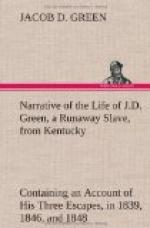it is sent forth “in the name of our Holy Christianity,”
and in the interests of “the cause of our most
Blessed Master.” Immediately after making
this declaration, however, the Confederate divines
commence a long series of arguments designed to prove
that the war cannot restore the Union; that the Southern
States had a right to secede; that having seceded,
their separation from the North is final; that the
proclamation of PRESIDENT LINCOLN, seeking to free
the slaves is a most horrible and wicked measure,
calling for “solemn protest on the part of the
people of GOD throughout the world;” that the
war against the Confederacy has made no progress;
and there seems no likelihood of the United States
accomplishing any good by its continuance. This
may be esteemed good gospel teaching in the Confederate
States, but in this country it would be thought to
have very little connection with “the cause
of our most Blessed Master.” But the Southern
clergymen reserve for the close of their address the
defence of the grand dogma of their religion—the
doctrine that negro slavery as carried out in the Southern
States of America “is not incompatible with our
holy Christianity.” Stupendous as this
proposition may appear to the British mind, it offers
no difficulty to these learned and pious men.
Nay, they are not only convinced that slavery is “not
incompatible” with Christianity, but they boldly
affirm that it is a divinely established institution,
designed to promote the temporal happiness and eternal
salvation of the negro race, and that all efforts
to bring about the abolition of slavery are sacrilegious
attempts to interfere with the “plans of Divine
Providence.” “We testify in the sight
of GOD,” say the clergy of the Confederate States,
“that the relation of master and slave among
us, however we may deplore abuses in this, as in any
other relations of mankind, is not incompatible with
our holy Christianity, and that the presence of the
Africans in our land is an occasion of gratitude on
their behalf before God; seeing that thereby
Divine Providence has brought them where missionaries
of the cross may freely proclaim to them the word of
salvation, and the work is not interrupted by agitating
fanaticism. * * * We regard Abolitionism as an interference
with the plans of Divine Providence. It has not
the signs of the Lord’s blessing. It is
a fanaticism which puts forth no good fruit; instead
of blessing, it has brought forth cursing; instead
of love, hatred, instead of life, death—bitterness
and sorrow, and pain; and infidelity and moral degeneracy
follow its labours.” There is no shirking
of the question here. Slavery is proclaimed to
be the GOD-appointed means for the regeneration of
the African race, and those who seek to bring about
the emancipation of the slaves are branded as apostles
of infidelity. Upon these grounds, the confederate
clergy appeal to Christians throughout the world to
aid them in creating a sentiment against this war—“against
persecution for conscience’ sake, against the
ravaging of the church of GOD by fanatical invasion.”




